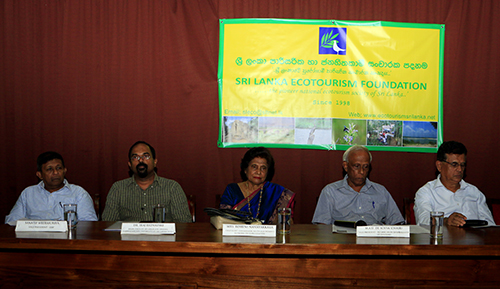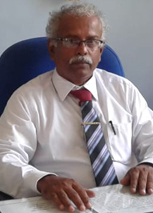“Story of Ecotourism Sri Lanka” authored by Palitha Gurusinghe, President, Sri Lanka Ecotourism Foundation, launched on the 28th September, 2017, at Mahaweli Center, Colombo, Sri Lanka
“Story of Ecotourism Sri Lanka, a treat for ecotourists, environmental enthusiasts, community activists, policy makers and tourism educators in the field of sustainable tourism where Palitha Gurusinghe compiles his views, perspectives, and more importantly his experience enriched with ecotourism development in Sri Lanka”
Dr. Iraj Ratnayake, Dean, Faculty of Graduate Studies, Sabaragamuwa University of Sri Lanka (SUSL)

Palitha is making the opening remarks
The book “Story of Ecotourism Sri Lanka” authored by Palitha Gurusinghe, President of Sri Lanka Ecotourism Foundation and the Secretary General of Asia Pacific Regional Ecotourism Council (APREC) , has been launched on Thursday, 28th of September, 2017, 2.30 p.m., at the Mahaweli Center, Colombo 07, Sri Lanka. The launching ceremony has been facilitated by Alumni Unity of University of Colombo in association with Sri Lanka Ecotourism Foundation. Palitha Gurusinghe is an Alumni of University of Ceylon, Peradeniya, (Colombo Campus-1965 Batch). The launch was chaired by A.M.U.De Soysa, Vice-President, of the Alumni. The launching ceremony was graced by the Chief Guest, Ms. Rohini Nanayakkara, former CEO, Bank of Ceylon and Seylan Bank and the Chairperson of Lanka Orient Leasing Company (LOLC). The Keynote Speaker of the launch was Dr. Iraj Ratnayake, Dean, Faculty of Graduate Studies, Sabaragamuwa University of Sri Lanka (SUSL) Rev. Hathiyalwala Chandananda, President, Madurawala Tourism Development Foundation and Chief Incumbent of Sri Sumangalaramaya, Ampitigala, Madurawala was an Invited Speaker. Mr. Nizam Lantra and Mr. Sanath Weerasuriya, two Vice-Presidents of the Sri Lanka Ecotourism Foundation co-chaired at the launch. Delivering the opening welcome remarks Palitha Gurusinghe, President, Sri Lanka Ecotourism Foundation said, “ in Sri Lanka, many, even some academics, researchers and most of the tourism officials, government, local government, bank officials, and the tourism stake holders do not clearly understand what Ecotourism is and often mix up the concept with adventure and nature tourism. Therefore, perhaps, to some extent, the information contained in the publication may help academics and students who are perusing their studies and researches in Ecotourism. He further told the audience “ to the best my knowledge, this book may be the first publication published on Ecotourism in Sri Lanka”

wala Chandananda, President, Madurawala Tourism
Development Foundation and Chief Incumbent of
Sri Sumangalaramaya, Ampitigal
Profile of “Story of Ecotourism Sri Lanka”
“Story of Ecotourism Sri Lanka” is written basically from the practical point of view, through the experience gained by the author over the years. Palitha, the founder President of Sri Lanka Ecotourism Foundation and the author of the book thought it is good to record important land marks of Sri Lanka Ecotourism for the benefit of those who are interested, inquisitive and looking forward to widen their horizons in Ecotourism. “Story of Ecotourism Sri Lanka” is a recollection of important land marks of Ecotourism development in Sri Lanka. For the author himself, it was something like ‘Going down the Memory Lane’ of his journey through nineteen years, during which how he involved in promoting Ecotourism in Sri Lanka. Therefore, reading through this book, a reader could get an idea on what Ecotourism is and to what extent the concepts of Ecotourism and activities are integrated and rooted in to the tourism fabric in Sri Lanka. In this book, the author has attempted to provide information on the enormous potential the Island possess to position Sri Lanka as an Ecotourism Destination on the world tourism map and also to identify the major issues and challenges that Ecotourism confronted in Sri Lanka. At the same time, he has clearly highlighted on how Ecotourism in Sri Lanka could contribute to alleviate poverty in the tourism generating areas and support environmental and biodiversity conservation in Sri Lanka.

Section of the participants
However, the author is of the view that Sri Lanka Ecotourism is still not developed up to the satisfactory standards in comparison to our neighboring countries in South Asia, South East Asia and the Pacific Region. To substantiate his views, he has sighted good examples and case studies from some countries like Sikkim, Tripura (India) and Bhutan etc. The author has identified many issues and challenges that Ecotourism in Sri Lanka has confronted. Reading through the book a reader could well understand this.
The major setback the Ecotourism has confronted in Sri Lanka is the ‘lack of recognition and contribution’ by the Ministry of Tourism, Sri Lanka Tourism Development Authority and the Sri Lanka Tourism Promotion Bureau. Sri Lanka Tourism Authorities have formulated Ecotourism National Policies, Guidelines and Strategic Action Plans on Ecotourism in 2003, some 14 (fourteen) years ago but has failed to legalize or implement them even today. Due to this, anyone who wishes to embark in the ecotourism business could interpret ecotourism as they wish and the end result would be that the most of these unscrupulous ‘ecotourism developers’ would be resorted to practices of ‘Green Washing Ecotourism’.

Dr- Iraj Ratnayake_Dean_Faculty of Graduate Studies
Sabaragamuwa University of Sri Lanka (SUSL)
Delivering the Keynote Speech, Dr. Iraj Ratnayake, Dean, Faculty of Graduate Studies, Sabaragamuwa University of Sri Lanka (SUSL) remarked; “Story of Ecotourism Sri Lanka “ is a detail account of Sri Lanka's effort in adapting, developing, and promoting ecotourism during last two decades. It is a memoir of sorts, a higher autobiography, and an echo back to Sri Lanka's pioneering ecotourism activist─ Palitha Gurusinghe.
The author emphasizes Sri Lanka's potential for local value addition in the process of ecotourism development where he compiles a rich account on astonishing resource base of the island nation. Especially the author is very critical and justifies the true potential of vibrant culture, centuries old heritage and the rich biodiversity to develop and promote ecotourism.
Gurusinghe hints with passion, where he presents some success stories of ecotourism especially from neighbouring states and asserts Sri Lanka's experience of developing the same and missed opportunities due to lack of necessary institutional support.

Lighting of traditional oil lamp

Invitees at the Head Table
Gurusinghe whose life journey was shaped with socialist ideology on one hand, appropriately determined his course of action towards empowering the underprivileged. In order to bring sustained peace to their lives, author's response to eradicate poverty through promoting ecotourism with a strong community stake has been highlighted.
On the other hand, the author's political assertion has led to a strong critique on the past and the present tourism development approaches of the country. He points out the repercussions resulting from undertaking tourism as a development activity in a policy vacuum.
In the context where we are considering tourism as a development strategy and therefore favouring much on the volume rather than value, Gurusinghe is of a different view. He critically argues as that present tourism development strategy of the country is in contradiction with the practice. His painstaking efforts were considerable which helped national tourism organisations to reconsider and reorient their agendas inclining towards development and promotion of ecotourism. Moreover, Gurusinghe in his arguments favours networking community initiatives, fair trade, and social responsibility as essential constituents of the success and the way towards disciplined development.
(‘Story of Ecotourism Sri Lanka’ is available for sale only from SLEF Office. Please contact SLEF on
sleco@sltnet.lk or call + 71 256 68 74)














